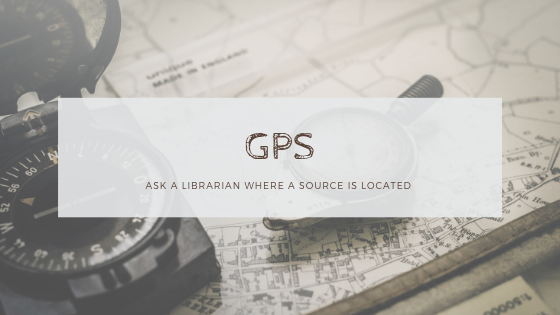- Give students extended time in-class to experiment and develop confidence with using keyword searches to identify relevant print sources in the school library.
- Use gamification principles to engage students in a positive way through research roadblocks that make them feel frustrated.
- Create an authentic experience for students to become oriented with the library and the library staff that is directly tied to classroom curriculum.
Preparation
Prior to the lesson plan, I asked our high school’s library team to pull together all the books in the library that they thought might be relevant to the seven topics students were researching. Using these piles as a starting point, I narrowed down selections to sources that were most relevant to the project and then hid a letter clue within the source on a small fluorescent post-it note. The clue was located in the portion of the book that was most relevant to the research project. If an entire book was relevant, the clue would be on the title page. If only one chapter was relevant, students would need to use the table of contents to find the clue. In other cases, students would need to use the index to find the page the clue was hidden on. Books were then all hidden (aka re-shelved) by the librarians.
Game day
On game day, student teams began by collaboratively working on a google doc to brainstorm keywords they would use in a card catalog search. Students were encouraged to think about keywords that were directly relevant to their topic, but also ones that were broader, narrower, and related.
As groups were ready (or as soon as they saw another group starting to run around the library), students entered their keywords into the catalog and went hunting for books. While students were competing to be the first team to find all of their books, record their work, and uncover the secret message from the clues, they were also given an envelope of game cards to play at any time throughout the class period.
How to play
Teams won the game by finding all their sources, correctly citing them, and unscrambling a secret word from the clues. For my game, some of the words were “globe(s)” and “perspective(s).” While groups varied in the number of sources they needed to find (between 5-12), these numbers reflected relatively equal difficulty – for example, for the group that needed to find 12 sources, 6 of the sources where shelved together under the same keyword.
A key component to setting the game up for students is letting them know the rules may change as the game goes on. Flexible rules help me adapt to game conditions I could not predict and keep things fair. For instance, I typically limit the number of “Xtra Mile” cards a team can be given. The cost of buying a new “Keyword” clue might raise or lower depending on how fast students are progressing.
Offensive Cards – Played to help your own team move ahead.
Keyword: Give this card to the teacher to receive a clue on a new direction to investigate. Clues typically involved encouraging students to go broader or narrower with their keywords, look for a primary source, or explore more general reference sources that might give them background information on a larger concept related to their topic.
GPS: Give this card to a member of the library staff to get help locating a source for which you have the call number This was a great way to get students to interact with library staff to discover different areas of the library.
Stopwatch: Receiving team must stop using technology for five minutes; this means they cannot use the catalog to find books or work on their citations.
Block: Some reference sources needed to be used by multiple teams. When this card is played you can steal a shared resource from another team for five minutes.
Xtra Mile: By far the most popular - a receiving team must find one additional source before completing the game. “Buried Treasure” can negate an “Xtra mile” card (see below).
Buried Treasure: Teams earn this card when they find a source that is relevant to their project but does not have a clue in it. I typically do not award cards for sources that are not from the correct time period, too general, or not academically rigorous. In addition to negating a defensive “Xtra Mile” card, this card can also be traded for a “Keyword” clue card.
For this game to work, you have to be comfortable with a loud and slightly chaotic visit to the library. I would frequently yell out to the larger group who was ahead, who just found a source (imagine a soccer announcer saying “GOOOOOOOOOAL” but as “CLUUUUUUUUUE”), when a team got blocked, etc. to increase excitement. Some students ran; some books got dropped. Many, many books needed to be re-shelved after the activity. However, it was all worth it when students audibly reacted with disappointment when the bell rang (no one had looked at the clock to pack up) and wanted to stay longer to finish the puzzle!







